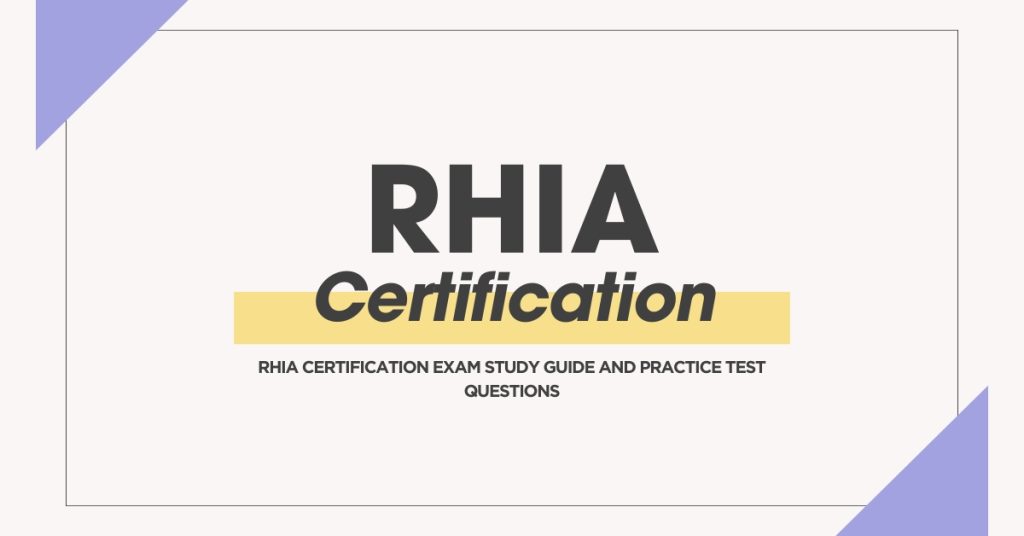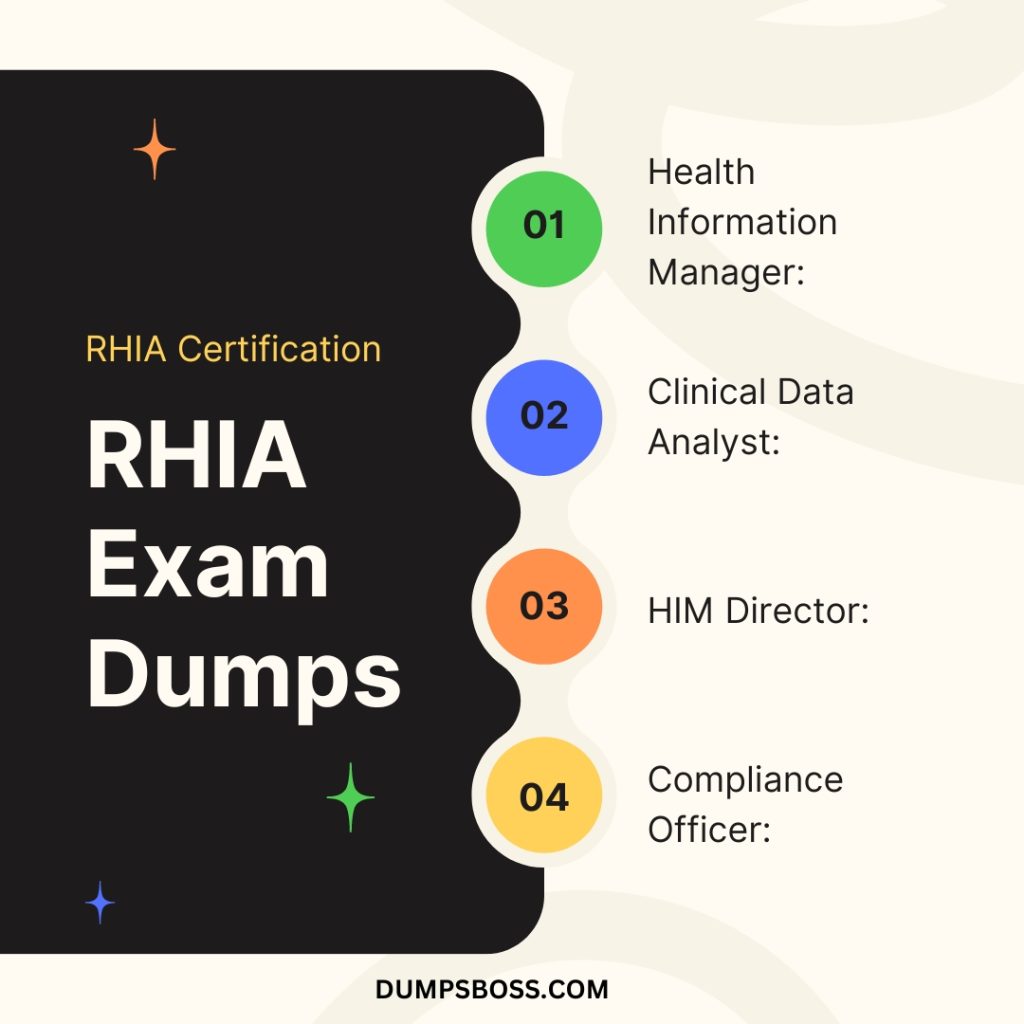
I. What is RHIA?
The Registered Health Information Administrator (RHIA) credential is a certification awarded to individuals who have demonstrated expertise in the management and analysis of health information.
RHIA-certified professionals play a vital role in the healthcare industry, ensuring the accuracy, privacy, and security of patient health data. They are responsible for maintaining and organising medical records, coding and classifying patient data, and analyzing health information to improve patient care and outcomes.
To obtain the RHIA credential, individuals must complete a bachelor's degree in health information management or a related field and pass a comprehensive examination administered by the American Health Information Management Association (AHIMA). RHIA-certified professionals must also adhere to a strict code of ethics and maintain continuing education to keep their skills and knowledge up to date.
II. Eligibility and Requirements
To be eligible for the RHIA credential, individuals must meet the following requirements:
- Hold a bachelor'sdegree in health information management or a related field from an accredited institution.
- Complete a minimum of 1,200 hours of supervised work experience in health information management.
- Pass the RHIA examination administered by AHIMA.
Individuals who have not completed a bachelor's degree in health information management may still be eligible for the RHIA credential if they have a combination of education and experience that is deemed equivalent by AHIMA.
Once an individual has met the eligibility requirements, they can apply to take the RHIA examination. The examination is offered twice a year, in the spring and fall. To maintain their RHIA credential, individuals must complete 75 continuing education units (CEUs) every five years.
RHIA-certified professionals are in high demand in the healthcare industry. They are employed in a variety of settings, including hospitals, clinics, insurance companies, and government agencies.
III. The RHIA Exam
The RHIA examination is a comprehensive assessment of an individual's knowledge and skills in health information management. The exam is divided into six domains:
- Health Data Management and Analysis
- Health Information Technology and Systems
- Health Information Governance and Compliance
- Health Information Privacy and Security
- Professional Practice
- Research and Quality Improvement
The exam is computer-based and consists of 170 multiple-choice questions. Candidates have four hours to complete the exam.
To prepare for the RHIA exam, individuals should review the AHIMA Body of Knowledge for RHIA Exam Candidates. This document outlines the specific knowledge and skills that will be tested on the exam.
Individuals can also purchase study materials from AHIMA or other vendors. There are also a number of online and in-person RHIA exam prep courses available.
Passing the RHIA exam is a challenging but achievable goal. With proper preparation, individuals can increase their chances of success.
=> Click to Place Your Order at the Best Available Price ✅
IV. Benefits of RHIA Certification
RHIA certification offers a number of benefits to individuals and their employers. For individuals, RHIA certification can lead to:
- Increased job opportunities
- Higher salaries
- Greater job satisfaction
- Enhanced career advancement opportunities
- Recognition as a healthcare information management expert
For employers, RHIA certification can lead to:
- Improved patient care
- Reduced costs
- Increased efficiency
- Enhanced compliance with regulatory requirements
- Improved reputation
In addition to these benefits, RHIA certification can also help individuals to stay up-to-date on the latest trends and developments in health information management. This can help them to provide better care to their patients and clients.
Overall, RHIA certification is a valuable credential that can benefit both individuals and their employers. It is a recognized symbol of excellence in the field of health information management.

V. How to Obtain RHIA Certification
To obtain RHIA certification, individuals must meet the following requirements:
- Hold a bachelor's degree in health information management or a related field from an accredited institution.
- Complete a minimum of 1,200 hours of supervised work experience in health information management.
- Pass the RHIA examination administered by AHIMA.
Individuals who have not completed a bachelor's degree in health information management may still be eligible for the RHIA credential if they have a combination of education and experience that is deemed equivalent by AHIMA.
Once an individual has met the eligibility requirements, they can apply to take the RHIA examination. The examination is offered twice a year, in the spring and fall. To maintain their RHIA credential, individuals must complete 75 continuing education units (CEUs) every five years.
Steps to Obtain RHIA Certification:
- Meet the eligibility requirements.
- Apply to take the RHIA examination.
- Prepare for the examination.
- Take and pass the examination.
- Maintain your RHIA credential by completing 75 CEUs every five years.
RHIA certification is a valuable credential that can benefit both individuals and their employers. It is a recognized symbol of excellence in the field of health information management.
VI. RHIA Career Paths
RHIA-certified professionals have a wide range of career opportunities in the healthcare industry. Some of the most common career paths include:
- Health Information Manager: RHIA-certified professionals with experience in managing health information departments can advance to roles as health information managers. Health information managers are responsible for the overall operation of health information departments, including staff supervision, budget management, and policy development.
- Health Information Analyst: RHIA-certified professionals with experience in analysing health information can advance to roles as health information analysts. Health information analysts use their skills to improve the quality of patient care, reduce costs, and improve efficiency.
- Privacy and Security Officer: RHIA-certified professionals with experience in health information privacy and security can advance to roles as privacy and security officers. Privacy and security officers are responsible for protecting the privacy and security of patient health information.
- Consultant: RHIA-certified professionals with extensive experience in health information management can work as consultants. Consultants provide advice and guidance to healthcare organizations on a variety of health information management topics.
In addition to these traditional career paths, RHIA-certified professionals can also work in a variety of other settings, such as insurance companies, government agencies, and healthcare technology companies.
With their specialized knowledge and skills, RHIA-certified professionals are in high demand in the healthcare industry. They play a vital role in ensuring the accuracy, privacy, and security of patient health information.
=> Click to Place Your Order at the Best Available Price ✅
VII. Conclusion
RHIA certification is a valuable credential for individuals who want to work in the field of health information management. It is a recognized symbol of excellence and can lead to a variety of career opportunities.
RHIA-certified professionals play a vital role in the healthcare industry. They ensure the accuracy, privacy, and security of patient health information. They also use their skills to improve the quality of patient care, reduce costs, and improve efficiency.
If you are interested in a career in health information management, I encourage you to pursue RHIA certification. It is a challenging but achievable goal that can open up a world of opportunities.
In addition to the benefits listed above, RHIA certification can also help you to stay up-to-date on the latest trends and developments in health information management. This can help you to provide better care to your patients and clients.
Overall, RHIA certification is a valuable credential that can benefit both individuals and their employers. It is a recognized symbol of excellence in the field of health information management.
Comments (0)